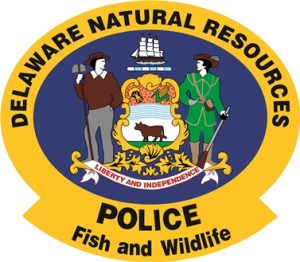Reminder for the week: Upstate trout season opens April 2; streams closed two weeks prior
 DOVER – To achieve public compliance through education and enforcement actions that help conserve Delaware’s fish and wildlife resources and ensure safe boating and public safety, DNREC Division of Fish & Wildlife Natural Resources Police officers between March 7-13 made 1002 contacts with anglers, boaters, hunters and the general public, including 38 vessel boardings for boating safety and fishing regulation compliance checks. Officers responded to 38 complaints and issued 11 citations, one of which was related to the C&D Canal Conservation Area and associated recreational trail, where there is an increased Fish & Wildlife Natural Resources Police presence.
DOVER – To achieve public compliance through education and enforcement actions that help conserve Delaware’s fish and wildlife resources and ensure safe boating and public safety, DNREC Division of Fish & Wildlife Natural Resources Police officers between March 7-13 made 1002 contacts with anglers, boaters, hunters and the general public, including 38 vessel boardings for boating safety and fishing regulation compliance checks. Officers responded to 38 complaints and issued 11 citations, one of which was related to the C&D Canal Conservation Area and associated recreational trail, where there is an increased Fish & Wildlife Natural Resources Police presence.
Citations issued by category, with the number of charges in parentheses, included:
Wildlife Conservation: Operating a motor vehicle off an established roadway on a state wildlife area (1)*, trespassing after hours on a state wildlife area (2), and dumping on a state wildlife area (1).
Fisheries Conservation: Unlicensed fishing (5), and improperly marked recreational gill net (1).
Boating and Boating Safety: Operating a vessel with insufficient number of life jackets (1).
* Citation issued at the C&D Canal Conservation Area.
Are you AWARE?
DNREC’s Division of Fish & Wildlife Natural Resources Police reminds anglers that Delaware’s upstate freshwater trout season opens at 7:30 a.m. Saturday, April 2, in six streams in New Castle County. The designated trout streams are closed to fishing for two weeks prior to the scheduled season opening, beginning Saturday, March 19.
The six designated trout streams are:
- Beaver Run, from the Delaware-Pennsylvania state line to the Brandywine River;
- Christina Creek, from the Delaware-Maryland state line through Rittenhouse Park;
- Mill Creek, from Brackenville Road to Route 7;
- Pike Creek, from Route 72 to Henderson Road;
- White Clay Creek, from the Delaware-Pennsylvania state line to the downstream side of Paper Mill Road; and
- Wilson Run, from Route 92 through Brandywine Creek State Park.
Downstate trout season remains open at Tidbury Pond in Dover and Newton Pond near Greenwood, both of which opened March 5. Trout are a cold water species and survive only while water temperatures in the ponds remain cool, so anglers are encouraged to keep their catch.
Most trout anglers are required to purchase a Delaware recreational fishing license and a Delaware Trout Stamp. The license covers fresh and tidal waters as well as crabbing and clamming and costs $8.50 for residents ages 16 through 64. Persons under the age of 16 and residents age 65 and older are not required to purchase fishing licenses in Delaware, although exempt persons may purchase fishing licenses and trout stamps if they so choose to help support fisheries management and trout stocking efforts. For non-resident anglers age 16 and older, a Delaware fishing license costs $20.
For residents age 16 through 64, a trout stamp costs $4.20. For residents age 12 through 15, a youth trout stamp costs $2.10. For non-residents, a trout stamp is required for all anglers age 12 and older and costs $6.20. Trout anglers younger than age 12 and resident anglers age 65 and older are not required to purchase a trout stamp. A trout stamp is not needed after April 1 at Tidbury Pond and Newton Pond or after June 30 to fish the trout streams.
Delaware fishing licenses and trout stamps are sold online, at the licensing desk in DNREC’s Richardson & Robbins Building, 89 Kings Highway, Dover, and by license agents statewide. To find a participating agent, or to purchase a license online, visit Delaware Licenses. For additional information on Delaware fishing licenses, call 302-739-9918.
For more information on fishing in Delaware, click on 2016 Delaware Fishing Guide. The guide also is available in printed form at DNREC’s Dover licensing desk, and from license agents throughout the state.
DNREC’s Division of Fish & Wildlife recognizes and thanks the majority of anglers, hunters and boaters who comply with and support Delaware’s fishing, hunting and boating laws and regulations. Citizens are encouraged to report fish, wildlife and boating violations to the Delaware Fish & Wildlife Natural Resources Police by calling 302-739-4580. Wildlife violations may also be reported anonymously to Operation Game Theft by calling 800-292-3030 or online at de.gov/ogt.
Media Contacts: Cpl. John McDerby, DNREC Division of Fish & Wildlife Natural Resources Police, 302-739-9913 or 302-354-1386, or Joanna Wilson, DNREC Public Affairs, 302-739-9902
Vol. 46, No. 84